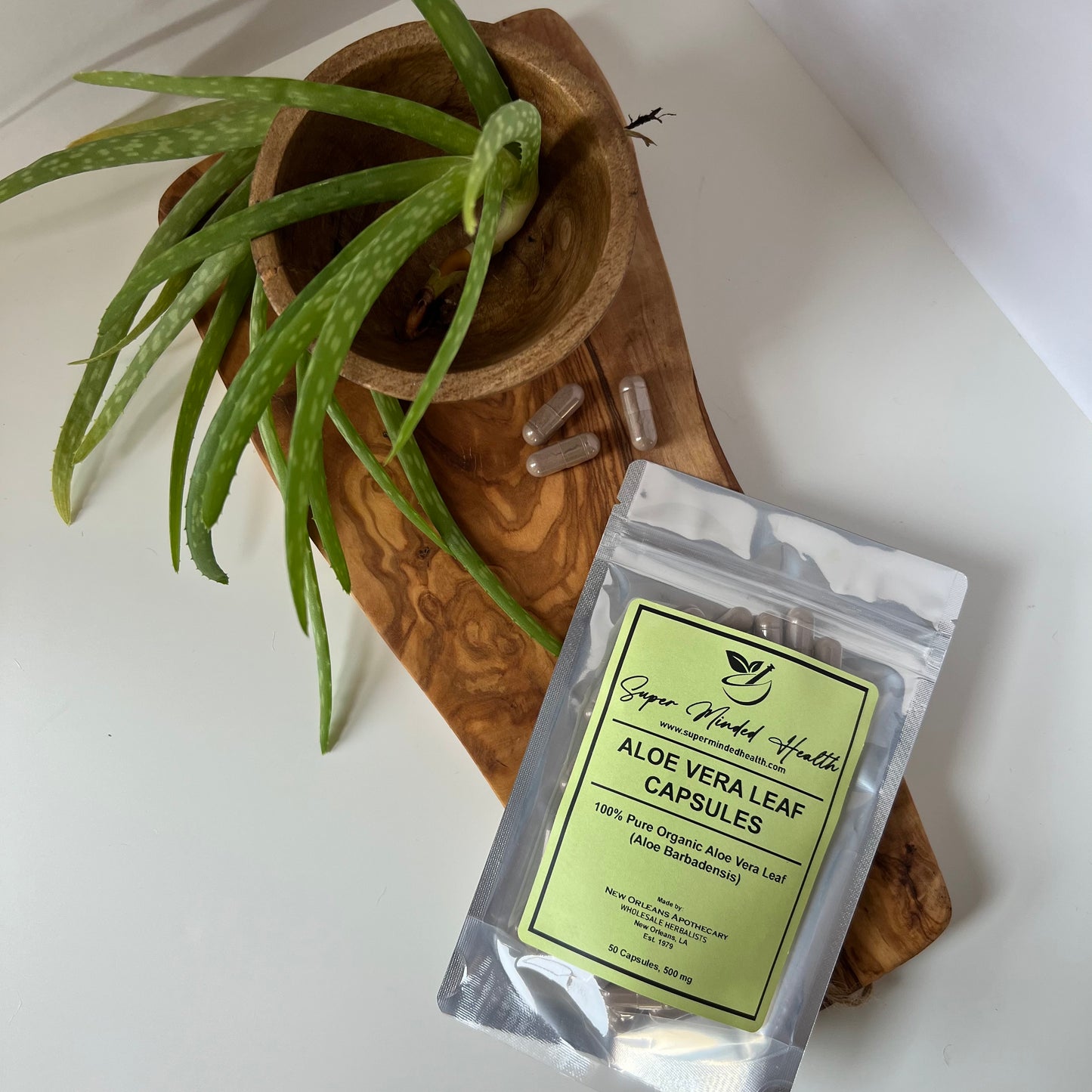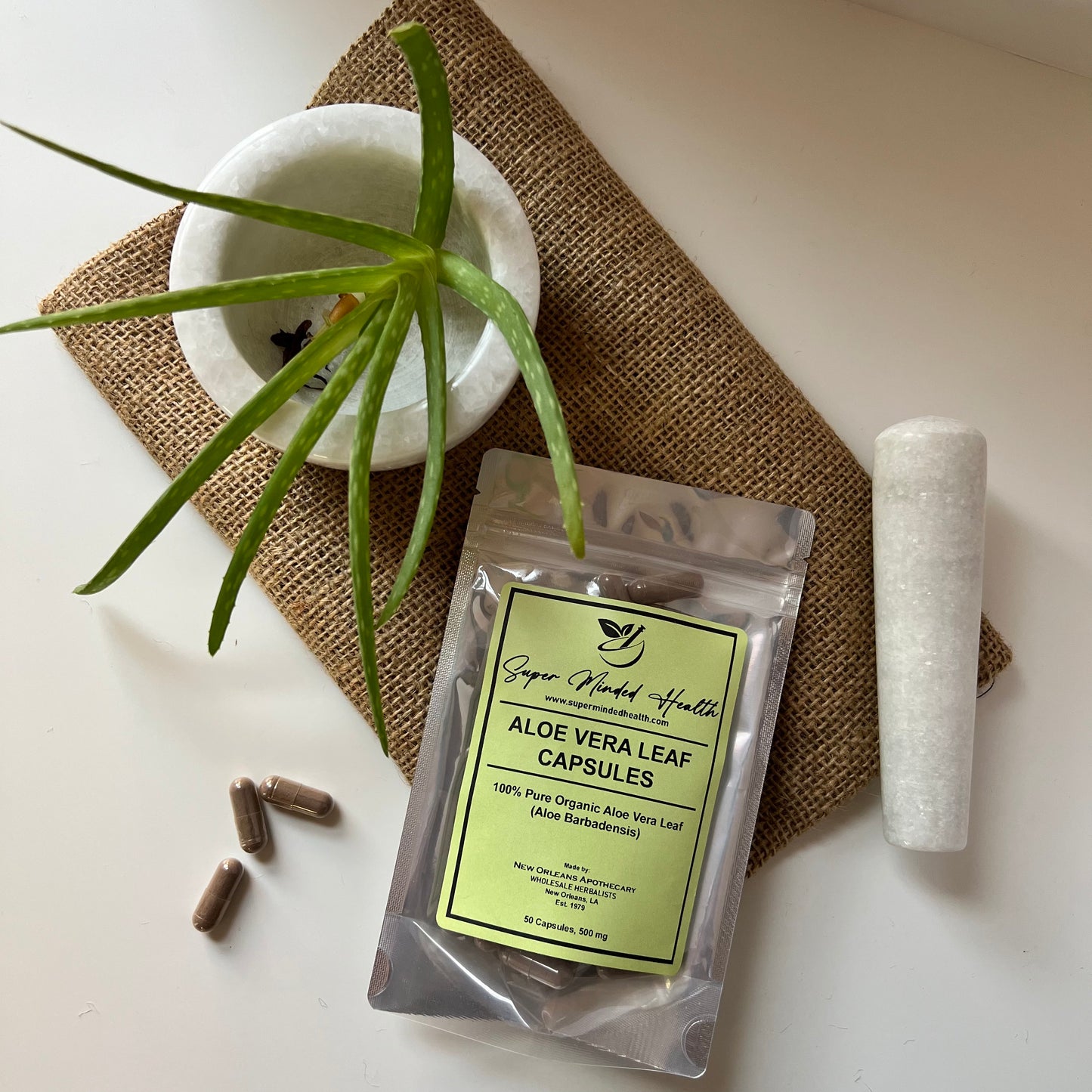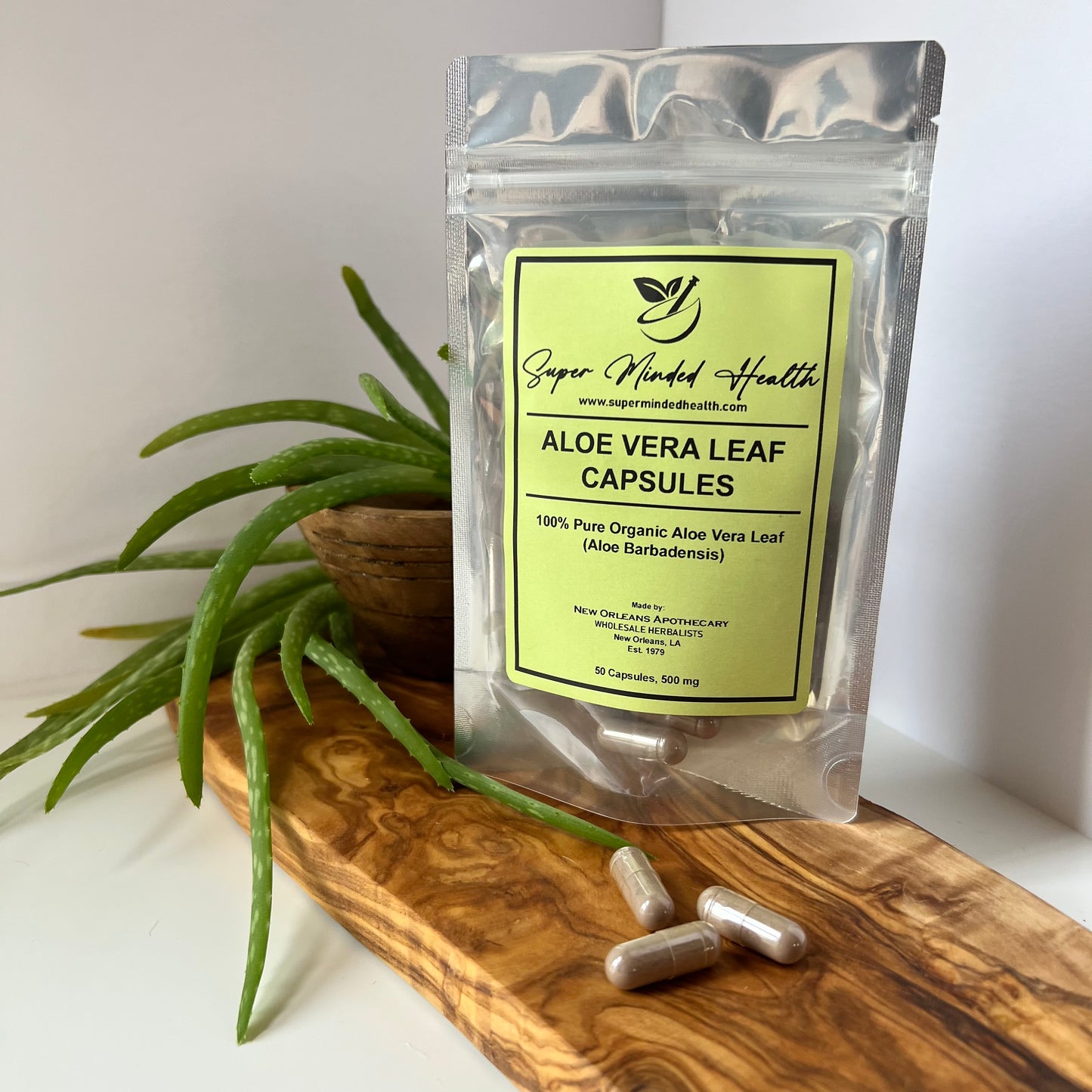Aloe Vera Leaf Capsules | Organic | Aloe Barbadensis | 500mg | Demulcent
Aloe Vera Leaf Capsules | Organic | Aloe Barbadensis | 500mg | Demulcent
4.89 / 5.0
(55) 55 total reviews
Couldn't load pickup availability
Organic Aloe Vera Leaf Capsules 500 mg
No Additives, No Fillers, No Binders.
100% PURE ORGANIC ALOE VERA LEAF CAPSULES 500mg Counteract Inflammation
Ghritkumari is a famous herb that has been used in Ayurveda since ancient times. There is evidence to support these claims as well, considering Alexander the Great and Christopher Columbus both used aloe vera to treat the wounds of their soldiers. Ghritkumari is also mentioned in ancient texts such as in Vedas (600 BC), Samhitas (1500-600 AD), Nighantus, and more.
Ghritkumari is a perennial, xerophytic, shrubby plant that is pea green in color. The stems are stout and thick and can grow up to 80-100 centimeters in length. Ghritkumari or Aloe barbadensis (botanical name) is most commonly known by the name Aloe vera. The name derives from the word Alloeh, an Arabic word meaning a substance with shining bitter character.
Belonging to the family liliaceae, the aloe vera plant has thick, lanceolate, fleshy leaves with sharp points protruding from the sides. The leaves can grow to be up to 18 inches long and 2 inches wide, and the color typically spans from green to gray green. The leaves are extremely rich in water, so it can survive for many years. Conversely, the flowers of the kumari are cylindrical, pendulous and of dense racemes. They are of yellow color and grow up to 2-3 centimeters.
Ghritkumari is native to the Mediterranean region of North Africa, Canary Islands and Southern Europe. Today, it is cultivated in the USA, Mexico, Asia, Southern Europe, Aruba, Bonaire, Bermuda, West Indies, the Bahamas, Central America, and Southern America. The aloe vera plant grows wildly in the coasts and coastal regions of South India.
Common Uses for Aloe Vera:
- Provide relief to burns and skin disorders
- Counteract inflammation
Other Benefits:
The Ghritkumari plants consist of various active phytochemicals that show great importance in providing relief from ailments. Various active phytochemicals are as followed:
Anthraquinone (compounds enriched with anti-bacterial, anti-viral, and analgesic properties)
Amino acids (contains 20 different amino acids that are required by humans, as well as 7-8 essential amino acids known to provide anti-bacterial and anti-inflammatory effects)
Carbohydrates (primarily monosaccharides and polysaccharides)
Hormones (includes gibberellins and auxins which have healing and anti-inflammatory properties)
Vitamins (vitamins A, C, and E, folic acid, choline, and B12 which help to nourish blood, body cells, and to neutralize free radicals)
Fatty acids (Ghritkumari provides four kinds of steroids: campesterol, lupeol, cholesterol, and B sitosterol. These steroids have properties like analgesic, anti-inflammatory and antiseptic)
Inorganic components (various minerals such as copper, selenium, magnesium, sodium, and more which are important to the various enzyme systems that have various metabolic functions)
Enzymes (high in various types of enzymes, including catalase, alkaline phosphatase, amylase, bradykinase cyclo oxidase, cyclooxygenase, lipase, oxidase, carboxypeptidase, carboxylase, and superoxide dismutase.
Benefits and Healing Effects:
- Helps in stabilizing blood sugar level
- Helps to provide relief to burns and other skin disorders
- Can aid relief for wounds and ulcers
- Helps to prevent growth of acne and moisturize skin
- Can soothe and treat sunburns
- Helps to treat fungus, insect bites, herpes, vaginal infections, and allergic reactions
- The juice of the aloe vera plant is sometimes used in tonics meant for conditions including jaundice, amenorrhea and piles
- Used as an antiseptic, helps to kill many viruses and bacteria
- May help prevent kidney stones, Crohn’s disease and IBS
- Can help to control the levels of cholesterol and oxidative stress
How it Can be Used:
The only part of the aloe vera plant that is used medicinally are the leaves. Recommended dosages vary between methods of intake:
- Leaf pulp 1-3 grams
- Fresh juice 10-20 ml
- Aqueous extract 100-300 mg
Aloe vera is most often taken in capsule form, directly applied to the skin as a relief gel, or used as a component in other products such as hand sanitizer.
When taken in capsule form, the aloe vera plant is primarily used to help to treat various health disorders and eczema, as it counteracts inflammation naturally. Since aloe vera has high concentrates in both vitamins C and E, it is easy for the skin to recover from skin inflammation after usage.
Recommended Dosage:
Aloe Vera is relatively safe and doses of 500 milligrams (mg) taken twice daily appear to be associated with improvements in blood sugar, as well as improvements in lipids (cholesterol and triglycerides).
Precautions:
Oral intake of aloe may cause abdominal cramps and diarrhea. To date, studies show no evidence of concerning side effects from this natural plant.
However, as is the case with taking any supplement while you’re pregnant or breastfeeding or taking medication, you should always consult your healthcare professional prior to usage.
This information has not been evaluated by the Food and Drug Administration.
This information is not intended to diagnose, treat, cure, or prevent any disease.
Share



Thank you! Happy New Year!
always glad to order from shop. everything is everything
I've already reviewed this item. Great stuff, excellent price, quick delivery. I will continue to patronize this store in the future.
I am a return customer so no need to really go on about my product. Great stuff, excellent price, speedy delivery and that is that. I always come back.
No directions on package but the seller messaged me in good timing with the info for taking. I wish it were on the back of the package and also where the product derived from for extra assurance of quality. They arrived on time and greatly sealed. I’ll let you know how they make fell later on the other review for the herbs. I ordered burdock root and aloe capsules with detox tea.



